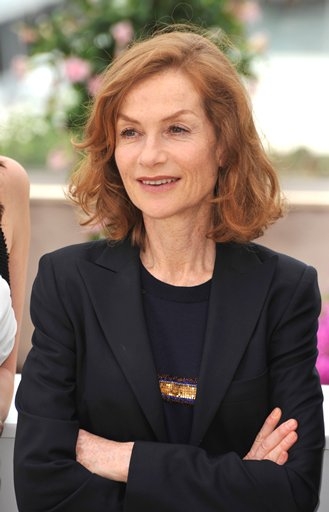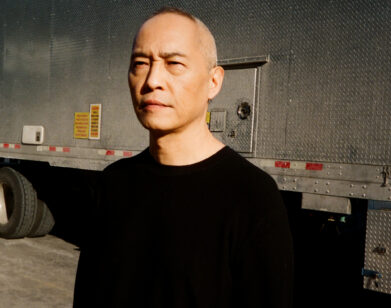Who Will Win the Palme D’Or

What began as one of the most promising Cannes fortnights in years—with impressive-sounding new offerings from world-class directors like Pedro Almodovar, Lars Von Trier, Quentin Tarantino and Gaspar Noe—has proved to be something of a disappointment, if the early reports from Twittering critics are to be believed. As of this writing, one major competition film has yet to be screened: Face, directed by the idiosyncratic Taiwanese filmmaker Tsai Ming-liang. But even if the Tsai is a masterpiece, the 2009 edition of Cannes will likely be remembered more for the major auteurs who whiffed than for surprise classics that premiered. (LEFT: ISABELLE HUPPERT. SHE DECIDES)
A lot will depend on the jury prizes, due to be given out this Sunday evening (Cannes time). If the jury, presided over by actress Isabelle Huppert, makes a strong choice for the winner of the festival’s top prize, the Palme D’Or, they could well frame the festival in a way that’s somewhat redemptive.
So who are the front-runners? Judging from the initial reviews and the roundups of the international press reactions, it’s likely a tight race between these six:
Bright Star (dir. Jane Campion) … After her first three movies (Sweetie, An Angel At My Table and The Piano), Campion seemed poised to join the ranks of the all-time greats, but she’s stumbled badly over the past decade, first with her tedious 1996 adaptation of Henry James’ The Portrait of a Lady and then with the off-key character studies Holy Smoke! and In The Cut. The jury may be willing to reward Campion just for returning to solid ground with Bright Star, a lyrical period romance that covers the complex, chaste relationship of John Keats and his muse Fanny Brawne. Although the fact that Campion already has a Palme-for The Piano-may work against her.
Odds: 10-1. Even if Bright Star‘s amazing-and it is, according to The Guardian‘s Peter Bradshaw, who calls it maybe the best of Campion’s career-an artful biopic about a Romantic poet hardly seems like the film these troubled times are calling for. And not every critic has been wowed. The Boston Globe’s Wesley Morris wrote, “I suppose I wanted more than flowers and butterflies from one of the world’s most important filmmakers.”
Fish Tank (dir. Andrea Arnold) Arnold helmed the Oscar-winning short Wasp and then made a respectable feature filmmaking debut with the 2006 suspenser Red Road. Fish Tank is about a working class teenager struggling with the lovelife of her single mother, and has been compared to the films of Lynn Ramsay and Ken Loach both in its poetic intimacy and its gritty realism. Arnold is clearly a director on the rise, and the jury may want to be among the first to anoint her.
Odds: 8-1. A movie about a woman living on the economic margins does seem relevant to our times, but is Fish Tank really a snapshot of life in 2009? GQ‘s Tom Carson seems to think so, saying, “[Arnold’s] preferred settings-England at its post-industrial, council-flat bleakest-don’t determine her attitude. Everybody’s prospects are dim, but she doesn’t tell cut-and-dried stories about impoverished lives.” But at The A.V. Club, Mike D’Angelo wonders about “the fuss being made in other quarters,” writing, “This film is awfully familiar: basically just a contemporary gloss on the classic British kitchen sink/angry young (wo)man drama.”
Les Herbes Folles (dir. Alain Resnais) As one of the legends of the French New Wave, Resnais might get a nod of appreciation just for continuing to work well into his 80s, and thus maintaining a connection to world cinema’s past. But if Les Herbes Folles (a.k.a. Wild Grass) wins the Palme, it won’t be some honorary “lifetime achievement” deal; people seem to genuinely love this film, which shows how a chain of coincidences affect a man nearing the end of his life. It’s reportedly light, funny and deeply moving.
Odds: 5-1. Critics generally agree that Les Herbes Folles is fairly minor, yet they nearly all like it quite a bit. On his blog, Roger Ebert writes, “(Resnais) has made one of those films perhaps only conceivable in old age … (illustrating) the likelihood that most of what happens in our lives comes about by sheer accident. To realize this is to become more philosophical; the best-laid plans of mice and men are irrelevant to the cosmos.”
A Prophet (dir. Jacques Audiard) Audiard’s films (such as Read My Lips and The Beat That My Heart Skipped) tend to be about scoundrels seeking redemption, and are generally more mainstream in style and tone than the typical Cannes competition fare. A Prophet is reportedly no departure for Audiard-it’s a tense prison drama about a teenager who endeavors to remake the gang culture from within-but critics and audiences have been raving about the movie’s cleverly constructed story and vivid characters. Comparisons have been made to last year’s Palme winner, the French high school drama The Class. Those comparisons could prove to be A Prophet’s downfall; the jury may not want to reward two consecutive crowd-pleasing French films of sociological import.
Odds: 2-1. Really only the “Do we want to go two-in-a-row on French films?” seems to be standing in A Prophet’s way. Stephen Garrett of Time Out New York sums up the general reaction to the movie when he writes, “(It is) a keen analysis of ascendant Franco-Arab identity during the Sarkozy era while staying firmly rooted as an absorbing character study of survival by any means necessary. … Both lurid and profound, A Prophet is transformative stuff, adding up to a stirring portrait of personal invention amid dead-end options and temptations toward self-destruction.”
Vincere (dir. Marco Bellocchio) … The 69-year-old Bellocchio has built a formidable career out of intelligent dramas rooted in Italian history. Vincere is about Ida Dalser, a beautician who fell in love with a young Benito Mussolini and bore him a son before Il Duce abandoned his family to pursue his political career in earnest. Bellocchio reportedly uses this true story as a metaphor for Italy’s disenchantment with fascism, though he primarily holds fast to the anxiety of a woman losing the man she loves.
Odds: 6-1. Critics haven’t been entirely sure what to make of Vincere, though they do think it’s stylish as all get-out. (“What distinguishes Vincere is the flair with which the tale is related,” says Time Out London’s Geoff Andrew.) Quite a few films at this festival seem to be about the root causes of societies gone awry; Vincere could be the jury’s chosen representative of the trend.
The White Ribbon (dir. Michael Haneke) Haneke has a history of tormenting willing Cannes-goers with creepy, bloody, sexually explicit films like Funny Games, The Piano Teacher, and Caché, but The White Ribbon finds him a more reserved mode, telling the story of a German village that suffers a rash of odd incidents and accidents on the eve of World War I. Shot in black-and-white, and featuring more characters and story than the average Haneke film, The White Ribbon appears to be his effort at a “mature,” career-defining work. Will the Cannes veteran finally get his due?
Odds: 3-1. If Vincere isn’t the “What the hell’s the matter with people?” movie of the year, than The White Ribbon may well be. And Haneke’s long association with the festival could be a factor as well, along with the fact that critics mostly love his work. (David Bourgeois at Movieline calls the new movie “brilliant.”) But not all critics love it. Mike D’Angelo gets off perhaps the line of the festival when he claims that The White Ribbon “[illustrates] Haneke’s usual thesis, which is that human beings are inherently deceitful and cruel and hence unworthy of musical accompaniment, much less color.”
Of course if the jury’s in a controversial mood, they could go with some of the films that have been the talk of the Palais-even if that talk has been largely heated and outraged. The first week of the festival was dominated with chatter about Lars Von Trier’s Antichrist, an existential horror film that shocked audiences with its violence and had them rolling their eyes at its clunky dialogue and heavy-handed moralizing. As of today, the talk is all about Gaspar Noe’s Enter The Void, a formally audacious life-after-death saga that drew an equal amount of boos and cheers at its first screening (along with crit-Tweets using words like “amazing” and “stoopid”).
Or the jury could go the safe route and stick with old reliables, like Pedro Almodovar, whose noir exercise Broken Embraces has drawn measured praise, or Quentin Tarantino, whose talky WWII revenge fantasy Inglourious Basterds has divided American critics but has some strong support among the Europeans. And there’s been a lot of quiet-but-unwaveringly-positive buzz around Elia Suleiman’s The Time That Remains, a sweeping, episodic, and satirical look at the history of Israeli-Palestinian relations; and around Ken Loach’s Looking For Eric, a change-of-pace comedy about a blue-collar Mancunian who has imaginary conversations with a famous footballer.
Which way will this jury break? Well, given the presence of boundary-testing Italian actor-director Asia Argento, American neo-realist James Gray, thoughtful Turkish auteur Nuri Bilge Ceylon and serious-minded actress Robin Wright Penn-not to mention the adventurous Mme. Huppert-it’s entirely possible that they’ll go for something edgy. But expect it to be a safe edgy.






